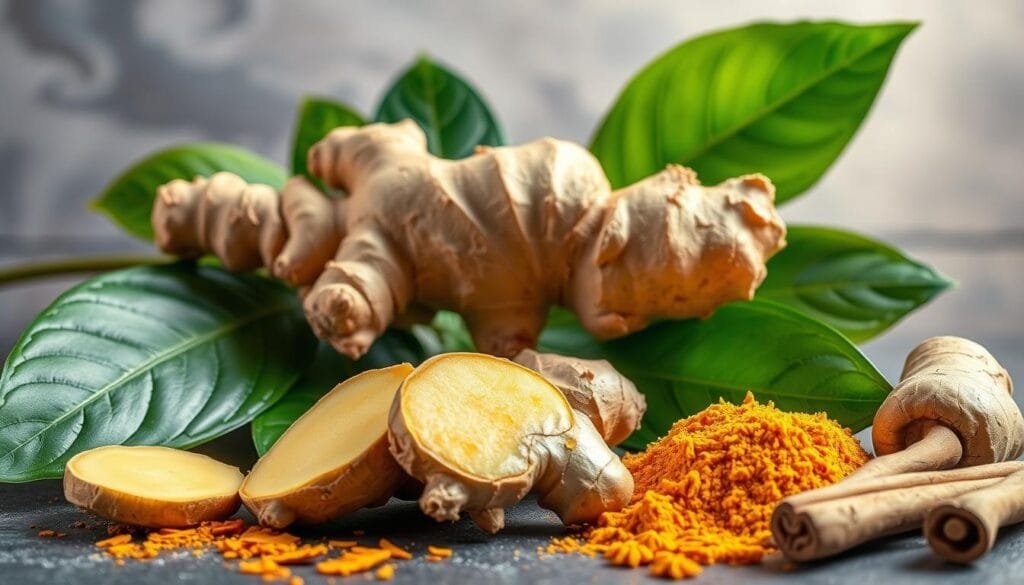I’ve always been fascinated by natural remedies, and ginger root is one that stands out. It comes from Southeast Asia and has been used for centuries. The key to its benefits is a compound called gingerol.
Ginger is known for its anti-inflammatory and antioxidant powers. It can help with nausea, digestion, and even fight cancer. In this article, we’ll look at 10 health benefits of ginger. It can be enjoyed fresh, dried, powdered, or as an oil or juice. Adding ginger to your daily routine can be very beneficial for your health.
Understanding Ginger Root: Origins and Properties
Ginger is a rhizome from the Zingiberaceae family. It has been a key part of Asian cuisine for over 4,400 years. It’s related to turmeric and cardamom, and it has a long history and many health benefits.
What Makes Ginger a Powerful Medicinal Plant
The main reason ginger is so good for health is gingerol. This compound makes up 1-3% of ginger’s essential oils. It gives ginger its unique taste and smell, and it has many health benefits.
The Role of Gingerol in Health Benefits
Gingerol has strong anti-inflammatory, antioxidant, and antimicrobial properties. This makes ginger a great natural remedy for many health issues. It can help with pain and inflammation, and it also helps with nausea and digestive problems.
Different Forms of Ginger Consumption
- Fresh ginger root, which can be used in cooking, juicing, or brewed into tea
- Dried, ground ginger powder, often used in baking and as a seasoning
- Ginger essential oil, which can be used topically or diffused for aromatherapy benefits
- Ginger supplements, such as capsules or extracts, for targeted health support
The daily amount of ginger recommended is 3-4 grams. But, this can change based on your health and needs. Always talk to a healthcare professional before adding ginger to your diet.
“Ginger has been used in China for over 2,000 years to aid digestion, treat stomach upset, diarrhea, and nausea.”
Benefits of Ginger Root for Digestive Health
Ginger is amazing for our digestive health. It helps with nausea and chronic indigestion. This natural root is a great solution for many gut problems.
Fighting Nausea and Morning Sickness
Ginger is known for fighting nausea. It works for morning sickness and nausea from chemotherapy. Its active compounds calm the stomach and cut down vomiting.
Managing Chronic Indigestion
Ginger helps with chronic indigestion too. It moves food through the digestive system and boosts digestive enzymes. This speeds up stomach emptying, easing discomfort.
Relief from Bloating and Gas
Ginger’s enzymes help with bloating and gas. A study showed ginger and artichoke before meals eased indigestion. It reduced fullness and stomach pain.
Ginger’s benefits come from its healthy enzymes and digestive movement. It’s a natural fix for nausea, indigestion, and bloating. Adding ginger to your diet could be very helpful.
Anti-Inflammatory Powers of Ginger
Ginger is known for its strong anti-inflammatory powers. This is thanks to gingerol, a key compound studied for its health benefits.
Ginger can help lessen muscle pain and soreness after exercise. It may also help with conditions like osteoarthritis by reducing pain and improving mobility.
Ginger’s anti-inflammatory and antioxidant properties are promising for fighting chronic diseases. This includes conditions like ulcerative colitis, Crohn’s disease, and rheumatoid arthritis. The compounds in ginger, like 6-shoagol and zingerone, offer protection against these diseases.
Ginger might also play a role in preventing and managing cancer. Its anti-inflammatory and antioxidant effects could lower the risk of some cancers and ease chemotherapy side effects.

Ginger is a natural treasure with anti-inflammatory and antioxidant effects. Adding ginger to your diet or taking supplements can offer many benefits. It can help with muscle soreness and support the fight against chronic inflammation.
Natural Pain Relief and Arthritis Management
If you’re looking for a natural pain relief, ginger might be what you need. This root is known for its pain-relieving and anti-inflammatory properties. It’s great for easing muscle soreness and joint pain from arthritis.
Muscle Pain Reduction
Ginger is good at reducing muscle pain and soreness, mainly after working out. A study found that those who took ginger after exercise had less pain the next day. The compounds in ginger, like gingerol, help block pain signals in the brain.
Joint Pain and Inflammation Support
Ginger also helps with joint pain and inflammation, common in arthritis. Studies show ginger supplements can lower pain and disability in knee osteoarthritis. Mixing ginger with black pepper and curcumin can even match naproxen in reducing knee pain and inflammation.
Alternative to Over-the-Counter Pain Medication
Ginger is a natural option for those avoiding over-the-counter pain meds. It’s as effective as ibuprofen in treating pain, with fewer stomach side effects. Start with 200-250 mg of ginger daily, divided into doses, to help with pain and inflammation.
Ginger can help with muscle soreness, joint pain, or managing arthritis symptoms naturally. Adding ginger to your routine might offer the relief you’re looking for.
| Study | Findings |
|---|---|
| Trial with 67 participants with osteoarthritis | Those given 170 mg capsules of ginger extract or 400 mg ibuprofen tablets showed significant reductions in pain scores and reported taking less paracetamol compared to those receiving placebo tablets. |
| Trial with 29 people with knee osteoarthritis | Participants treated with 250 mg of ginger capsules four times a day for 3 months reported a significant reduction in pain and disease-related disability compared to the placebo group. |
| Trial with 247 participants with knee osteoarthritis | 63% of those treated with ginger experienced a significant reduction in knee pain compared to 50% of the placebo group. |
Always talk to a healthcare professional before adding ginger or any supplement to your routine. This is important if you have health conditions or are on medications.
Weight Management and Metabolism Support
Ginger, a spicy root with a long history in medicine, might help with weight management. Research shows it can boost metabolism and support natural weight loss.
A 2015 study showed that women with obesity who took ginger powder daily lost weight and felt less hungry. Another study with 10 men found that ginger in their breakfast drink made them feel fuller and burned more calories.
A review of 14 studies confirmed ginger’s benefits for weight management. It found that ginger reduced body weight and waist size. But, more research is needed to be sure.
Ginger’s benefits for weight don’t end there. It can also help control blood sugar and make you feel full. Adding it to apple cider vinegar, green tea, and lemon can boost your weight loss efforts.
While ginger is usually safe, it can cause stomach issues in some. Pregnant women should only have 1 gram a day. Always talk to a doctor before adding ginger to your diet.
| Ginger Compound | Potential Benefits |
|---|---|
| Gingerols | Anti-inflammatory, antioxidant, and possible anti-cancer effects |
| Shogaols | Boosts thermogenesis and may fight cancer |
Adding ginger to your diet can help with weight management and metabolism. Just make sure to talk to a healthcare professional about using ginger safely and effectively.

Heart Health and Cholesterol Control
Ginger, a vibrant root from Southeast Asia, is great for your heart. It has anti-inflammatory properties and can thin your blood. These traits help fight heart disease.
Impact on Blood Pressure
Studies show ginger can lower blood pressure. It does this by affecting blood pressure in a good way. This helps keep your blood pressure healthy.
Cholesterol Level Management
Ginger is also good for cholesterol. A 2022 review found it lowers bad cholesterol and raises good cholesterol. This helps prevent artery blockages and heart disease.
Cardiovascular Protection
Ginger does more than just affect blood pressure and cholesterol. Its [6]-gingerol can stop new blood vessels from forming. This might slow cancer growth. Ginger also stops new blood vessels from forming, which helps prevent tumors.
Adding ginger-infused water or ginger foods to your diet is easy. It supports heart health and keeps cholesterol levels in check.
| Ginger Compound | Cardiovascular Benefits |
|---|---|
| [6]-gingerol | Inhibits new blood vessel formation, reduces growth of cancerous cells |
| Gingerol | Demonstrates tumor-preventive properties by inhibiting angiogenesis |
“Ginger’s ability to maintain healthy blood pressure and cholesterol levels makes it a valuable addition to any heart-healthy lifestyle.”
Brain Function and Cognitive Benefits
Ginger, the vibrant root, adds a zesty punch to our favorite dishes. It may also be a powerful ally for brain health and cognitive function. Research suggests ginger’s antioxidant and anti-inflammatory properties can protect against age-related brain decline.
A study with 60 healthy, middle-aged Thai women showed ginger’s benefits. They took a ginger root extract daily for 2 months. This led to better memory, focus, and reaction time.
The participants who took 400 mg or 800 mg of ginger had enhanced brain wave activity. They also had better working memory compared to the placebo group.
Ginger’s power comes from compounds like gingerol and oleoresin. These compounds are strong antioxidants and neuroprotectors. They can reduce brain inflammation, fight oxidative stress, and improve blood flow for better cognitive performance.
Ginger may also help with mental health. It can affect neurotransmitters like serotonin and dopamine. This could help manage depression and anxiety.
Adding ginger to your diet can support brain health and cognitive abilities. You can use fresh, dried, or supplemental forms. Pair it with brain-boosting foods like fatty fish, nuts, and berries for a holistic approach to mind health.

“Ginger’s antioxidant and anti-inflammatory properties make it a promising natural remedy for supporting brain function and cognitive health.”
Immune System Enhancement and Disease Prevention
Ginger is more than a tasty addition to meals. It’s a powerful ally in boosting your immune system and fighting infections. Its antimicrobial and antifungal properties help protect against common illnesses like colds and flu.
Antioxidant Properties
Ginger’s immunity-enhancing abilities come from its antioxidants. These compounds fight off harmful free radicals. They protect your cells from oxidative stress and chronic diseases.
Studies show that ginger’s antioxidants reduce inflammation and support immune function.
Fighting Common Infections
Ginger’s antibacterial and antiviral properties make it a natural infection fighter. It can help ease symptoms of colds and flu, like coughs, fevers, and headaches. Its ability to combat germs like E. coli and Staphylococcus aureus is valuable for overall wellness.
Seasonal Illness Protection
Ginger helps protect against seasonal illnesses. Its immune-boosting properties strengthen your body’s defenses. This makes it more resistant to viruses and bacteria that cause seasonal flu and other winter ailments.
Incorporating ginger into your daily routine can keep you healthy all year. It fights oxidative stress, infections, and provides seasonal protection. Ginger supports your immune system, making you healthier and more resilient.
“Ginger’s ability to combat various germs and viruses makes it a valuable addition to one’s diet for overall immune system support and disease prevention.”

Incorporating Ginger into Your Daily Diet
Adding ginger to your daily meals is easy and beneficial. You can make ginger tea by steeping ginger in hot water. Add honey or lemon for extra taste. Ginger also fits well in many dishes, like stir-fries, soups, curries, and even desserts or smoothies.
For a strong ginger flavor, try a daily ginger juice shot. Raw, unpeeled ginger is great for quick health benefits. When cooking, ginger pairs well with many foods. It adds a nice zesty taste to both savory and sweet dishes.
There are many ways to enjoy ginger, like ginger tea, ginger-infused meals, or a daily shot. With a bit of creativity, you can find tasty ways to include ginger in your diet. This way, you can benefit from its health-promoting properties every day.







